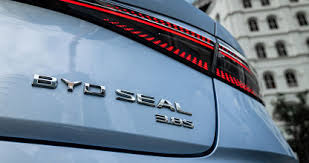The CEO of Tesla, the leading US EV manufacturer, Elon Musk, highlighted the pressure on his company on Wednesday when he claimed that Chinese manufacturers will “demolish” their international competitors in the absence of trade obstacles. Companies like BYD are vying for market share globally.
BYD, funded by Warren Buffett, despite Tesla’s steep price cuts through 2023, surpassed the American automaker as the best-selling EV company globally last quarter with its more affordable models and diverse lineup. This is when Musk made his remarks.
During a Wednesday post-earnings call with analysts, Musk stated that Chinese automakers were the “most competitive” and that they “will have significant success outside of China, depending on what kind of tariffs or trade barriers are established.”
Laptops 1000“If there are no trade barriers established, they will pretty much demolish most other car companies in the world,” he stated. “They’re extremely good.”
At a routine briefing on Thursday, the Chinese foreign ministry was questioned about Musk’s remarks and stated that while it was not aware of the stories, it supported “maintaining a fair, just, and open business environment.”.
Musk has good cause for anxiety.
In an attempt to court customers who were burdened with high borrowing rates, he started a price battle last year, which hurt Tesla’s profits and alarmed investors. Tesla was approaching “the natural limit of cost reduction” with its current portfolio, Musk cautioned on Wednesday.
Tesla intends to begin manufacturing a mass-market, lower-cost compact crossover dubbed “Redwood” in mid-2025 to compete with less-priced rivals. Tesla plans to begin producing its next-generation electric vehicle at its Texas factory in the second half of 2025, Musk announced on Wednesday.
Laptops 1000Yet, Chinese EV manufacturers are developing quickly because they are skilled at controlling costs through a reliable supply chain. After years of state subsidies helped boost domestic sales, companies are now concentrating on swiftly extending their overseas footprint in China due to rising competition and spare capacity.
“The resilience and completeness of China’s multi-decade state-directed battery materials processing infrastructure build out is biting hard,” stated Ross Gregory, a partner at Melbourne-based consultancy New Electric Partners.
In an attempt to increase sales abroad, China’s SAIC Motor has been ordering additional vehicle vessels for its fleet to offset the cost of transportation.
However, according to Spencer Imel, a partner at consumer research firm Lansgton, “Chinese automakers have a long way to go to win U.S. market share” because their brand awareness is extremely low and their reliability, durability, and safety are average.
“They enjoy high demand in China with innovation such as in-car technology and battery swapping,” Imel stated. “That, we believe, will be an important ingredient and a differentiator in their future growth overseas.”
Musk’s remarks coincide with the accelerating pace of the US presidential election. According to President Joe Biden, he “won’t let that happen” and that China was determined to control the EV market.
Leading candidate for the Republican presidential nomination this year, former president Donald Trump, has hinted that he would redouble his efforts to impose harsher tariffs if elected. He has called for a 10% universal duty on all imports into the United States and the revocation of China’s most-favored-nation trading status.
Musk stated on Wednesday that while there was “no obvious opportunity” to collaborate with Chinese competitors, Tesla was willing to license other technologies like self-driving cars and grant them access to its charging network.
In regards to Chinese EV manufacturers, Europe has likewise adopted a protectionist posture. The European Commission began looking into the possibility of imposing punitive tariffs last year to shield EU manufacturers from lower-priced Chinese EV imports that it claims are gaining access to government subsidies.
Gregory of New Electric stated that more than tariffs, the United States and Europe need policies that will provide their automakers the time to create a diversified supply chain.


















